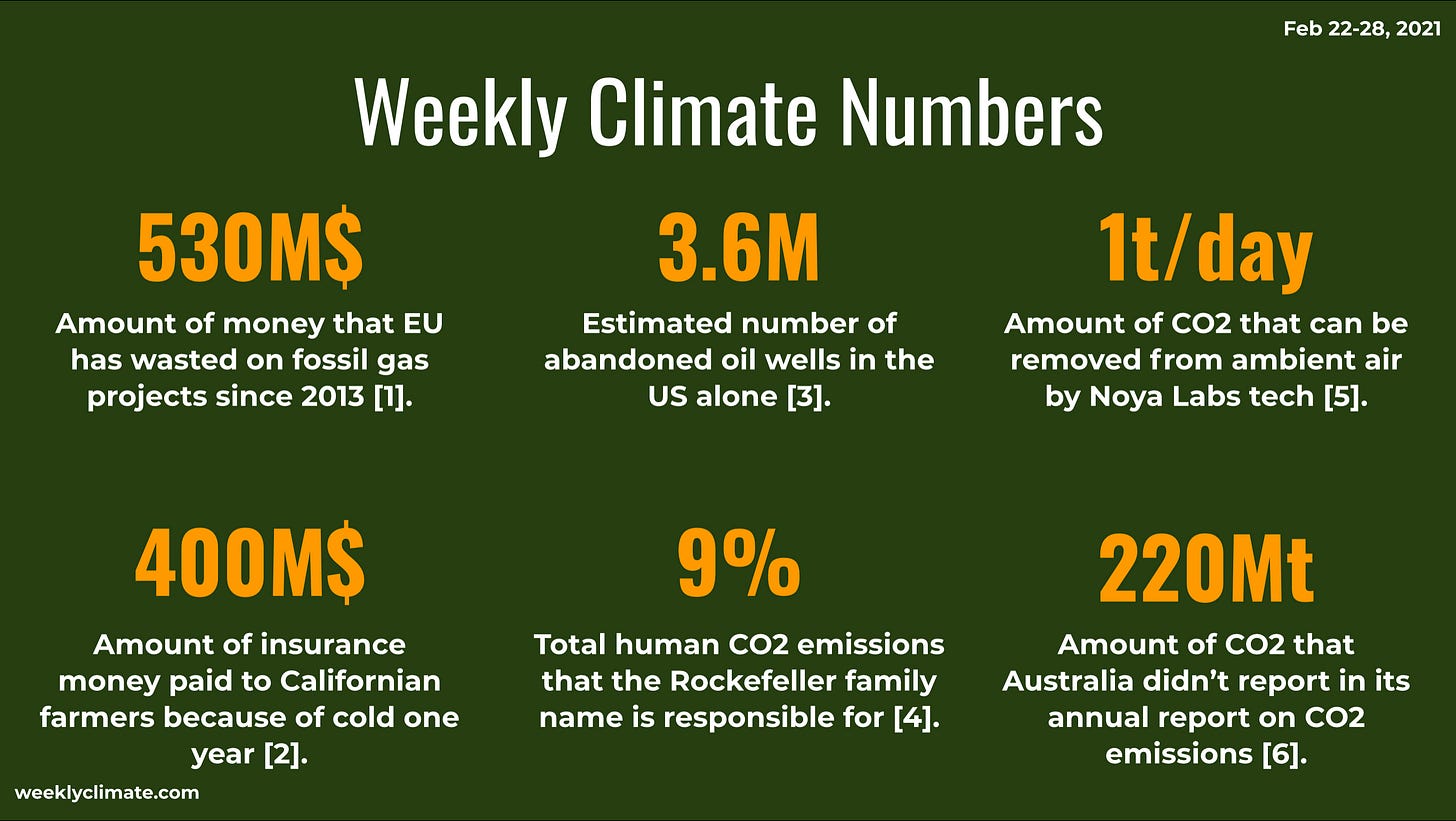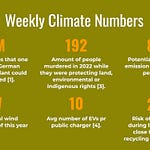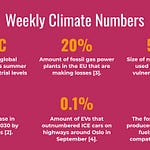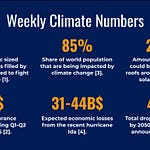Welcome to this weeks edition of The Weekly Climate 🎉
References: [1], [2], [3], [4], [5] and [6].
‼️News you can’t miss
Here’s one important scary/bad (🙀), good (😻), interesting (😼) and fossil (💩) news item.
🙀 An important ocean current that is known for shaping our climate is at its weakest in the past 1000 years.
😻 Exxon has stranded 98% of its assets in the Canadian oil sands.
😼 Following up on our coverage of Texas last week, this article sums up the most important lessons from the event.
💩 Drilled news has uncovered an interesting tie between the fossil fuel industry, tobacco industry and execs of public media.
👩⚕️ Status: Climate & Science
Let’s look at how we’re doing this week!
[#ocean] — New research shows that an ocean current known as Atlantic Meridional Overturning Circulation is at its weakest point. Ocean current in general and certainly this one are known to have a big impact of the climate of the Earth.
[#wildfires] — Small wildfires are good. Intense and frequent megafires are not. A new global study confirmed the suspicion that more intense and frequent fires will reduce the forests ability to capture and store carbon and it may even lead to smaller and weaker trees, which further reduces the carbon sink capacity of the forest.
[#iceberg] — An huge iceberg with a total area of 1270 km2 has broken off in the Antarctic. That’s 10 times the area of Copenhagen, about twice the size of New York City, but still 4 times smaller than the worlds largest iceberg A68a. It’s been almost a decade since the British Antarctic Survey detected the first cracks in the ice that ultimately has lead to this gigantic iceberg.
📰 The 7 Grand Challenges
⚡️Decarbonize Electricity
Clean electricity is the one do-or-die challenge we must solve.
[#eu] — EU has wasted 440M€ of tax payer money in failed gas projects since 2013. It should be said that the largest portion (430M€ actually) is wasted on just one pipeline connecting Bulgaria, Romania, Hungary and Austria with the gas reserves in Black Sea. That project failed because Exxon has decided to sell off it’s licenses.
[#longdurationstorage] — A google spin-off called Malta, secures a 50M$ Series B round to further develop its advanced thermal long duration storage. Long duration storage is an important piece of the puzzle in order to make the large scale renewable energy deployments easy to do. The current version of their technology can store energy for 4hours, but is expecting 8 to 10 hours soon.
[#texas] — A great overview and reflection on the lessons learned from Texas’ recent energy crisis. One of the major lessons is: “Just about everything fails, so we shouldn’t just blame one energy source”.
[#fusion] — A new report highlights that fusion could (as expected) play an important role in decarbonizing electricity and it recommends that the US (it is founded in the US) an aggressive market drive model to develop fusion power. What’s interesting about this report is that a group of scientists concluded that fusion has a role to play in decarbonizing the US. Fusion has (and to some degree still is) long believed to be too far from realization to be relevant to the climate crisis. Will be interesting to see how this will be received in the wider climate science community.
🏘 Reduce impact of urban and rural areas
Lowering the impact of urban and rural areas.
[#ev] — EVs are great, but they don’t matter at all if only the richest 10% of the people can buy one. Grist looks at the situation regarding EVs and poor communities. And it’s not very good. Not only are the cars themselves still not affordable for anyone, but public chargers are much more numerous in rich compared to low income communities. Much more to be done here.
[#oranges] — A very Spanish problem. The town of Seville is known for it’s many fruit trees lining the streets of the city. The cities 48.000 trees produce 5700 tons of fruit every year. And in the winter time all that fruit is a bit of a headache for the city. Now a new project is launched to turn all the fruit waste into biogas and thus electricity
🛁 Clean non-electrifiable activities
Some activities we do today can’t be electrified, these must be cleaned some other way.
[#steel] — A 2.5B€ green hydrogen steel venture is launched. Similar in ambition as the swedish Northvolt, the H2 Green Steel initiative is aiming to setup a green steel production using green hydrogen. The plant is expected to be profitable by 2030.
🌳 Protect and grow nature
Nature is our ally, we must protect it and help it help us.
[#soil] — Soil carbon. How does it work and how much CO2 can it actually sequester? One of the positive aspects of Australia’s climate plans is the focus on soil carbon (although there are also those who would like that the agricultural sector is exempted from any climate crisis mitigation attempts). This article in The Guardian looks at Australia as a case study for what soil carbon can do.
🍽 Optimize food
Without the lower impact of food or drink the hero doesn’t work (modified old danish proverb).
[#warming] — Inside Climate News looks at what global warming means for farmers in California. Fruit trees require frost at very specific times to get high quality yields whereas frost at the wrong times can prove expensive. More than 400M$ have been paid out in insurance payment in a case where a cold snap caused large yield losses to California farmers. The silver lining is that global warming may lead to few cold snaps, which may then also be bad if there are too few.
⚖️ Climate Justice
Without justice there’s no future.
[#kiribati] — In 2014 the small island state of Kiribati bought a piece of land in Fiji where the purpose of the purchase was to secure land for the islands inhabitants when Kiribati was swallowed by rising seas. This have later been rejected by scientists as actually happening, because Kiribati is so called sand atolls, which rises with the rising sea levels. However, that land will now be used to produce food for the island state. The diplomatic challenge is that China will help with that. And that is sparking fear that China will use Kiribati’s strategic position for an army base.
[#solar] — In an open letter, 10 countries in the developing world has called on rich nations to help give their citizens access to clean electricity. Mainly via rooftop solar. They write that renewable energy is especially useful in rural areas.
⬇️ Engineered drawdown and geoengineering
Protecting our planet and species one way or another
[#dac] — This is really cool. Ever since I read a paper on crowd oil a few years ago I’ve been really intrigued by finding the right air vent to attach direct air capture to. A startup called Noya Labs are doing just that. In fact they have tried it with a couple of products. They even had a consumer product that was an air purifier that also capture CO2, but couldn’t get the unit economics to work. Instead what they do now is attaching their direct air capture tech to cooling towers of industry plants and doing that they can capture between 0.5 and 1 ton of CO2 per day. Will be exciting to get some production costs for those tonnes of CO2.
Update: Josh from Noya Labs was kind to reach out and let us know that the TC article referenced here missed to write that the technology can scale up to 180 t/day currently. Thanks Josh 🙏
📦 Other / catch-all
All the other stuff that I couldn’t fit into any of the other categories, than the other category.
[#blackrock] — There are a lot of corporate promises on helping to solve the climate crisis. Most recently with BlackRock CEOs Larry Fink’s letter stating that they want all their assets to remove as much CO2 as they emit by 2050. Beautiful words, but are they acted on? This article dives deep (and Bill McKibben calls bullshit, see later under Major Carbon Emitters).
[#billionaries] — With Bill Gates recent new book, a recurring debate has reignited, which is what are all these billionaires fighting climate change really spending their money on. This in depth post from Grist looks into a few from the dirty Rockefellers — the family who started Standard Oil, that has turned into Exxon, Chevron and BP and who’s companies are responsible for a total (not yearly, no I mean TOTAL) human carbon emissions of 9% — to newer tech billionaires such as Bill Gates and Elon Musk. It’s the age old climate debate of whether we have the technology we need to solve the climate crisis or not.
⭐️Special Topics
🎩 Global and local policy
We have a special interest in covering the major global and local policies regarding climate, whether good or bad.
[#policysimulator] — An open-source policy simulator has shown that stopping carbon pollution in the US would add 1T$ to the US economy. The simulator is actually quite fun and interesting to play with.
[#renewables] — A new report has analyzed all the different ways that local governments in the US are blocking renewable energy. And the reasons are ... quite diverse. Right from protecting sparrow habitats to shadow flicker from wind turbines. Yes shadow flicker. You know because the wind turbine is casting a shadow on the ground which flickers when it spins.
[#ndc] — The UN has made its first report on the newly submitted updated NDCs submitted by UN members. And it’s not looking very good. The UNFCC says in a press release that further ambition is needed if we are to achieve 1.5C or 2C. Many major emitters submitted the NDCs without increasing their ambitions which is sorely needed.
⛽️Major Carbon Emitters
We have a special interest in covering the moving of the major carbon emitters as these are the key roadblock to climate action.
[#collaboration] — I have posted quite a lot about lawsuits against the fossil fuel industry and this Grist post looks at how to use lawsuits and international collaboration to take down the fossil fuel industry. It definitely does sound like a way that should be pursued.
[#publicmedia] — Drilled News has uncovered an interesting tie between the fossil fuel industry, the tobacco industry and surprisingly public media in the US. All of them had something to do with the PR firm E. Bruce Harison. Representatives of public media is supposed to be impartial but this does not appear to have been the case here.
[#wallstreet] — Bill McKibben tears into Wall Street for not doing anything to help the climate crisis. Despite many lofty promises. His comments comes in the light of the article we also published last week about how top execs on Wall Streets warns against divesting in fossil fuel stocks.
[#oilwells] — Who’s going to clean up after the fossil fuel industries many abandoned oil wells asks this Guardian article. There’s an estimate 3.6 million abandoned oil wells in the US alone. They’re leaking greenhouse gases and they are contaminating ground water. The bill to clean them up will be in the billions.
[#bitcoin] — So bitcoin huh? Anybody HODL’ing? I had a phase a few years ago were blockchain became the solution to all my problems. I even made a bit of money speculating in a lucky moment. But the thing that ultimately turned me off was the technology’s immense waste of resources. Which this article seems to confirm. Blockchain tech might be important, and I know that there are ways to eliminate the computational waste and there are even some chains that does that and that’s great. But I still believe that all the proponents of it (and especially the blockchains like bitcoin that are using the more wasteful protocols) has yet to show one impactful application short of cryptokitties 😾. If any readers have one, I’m more than curious to learn about it. Please comment below.
[#strandedassets] — My eyes went pretty wide when I read this one. Exxon has stranded 98% of its assets in the Canadian oil sands. A total of 15 million barrels has been wiped off it’s balance sheets in filing this wednesday. According to Bloomberg, Exxon still has enough reserves yet to keep us burning fossil fuels all day every day for the next 11 years (which is down from 15 years in 2019).
That’s it for this week folks! Remember if you’re feeling down, angry or sad from some of the news in this newsletter one cure is to act. And one way you can always act that also happens to be one of the most powerful things you can do is to talk about it. That also works if what you just read made you hopeful or happy btw.
If you enjoyed this newsletter don’t forget to share it with your friends, coworkers or other people you think could benefit from getting it. If you got directed here by a friend or another link on the Internet don’t forget to subscribe!
See you all next week 👋












